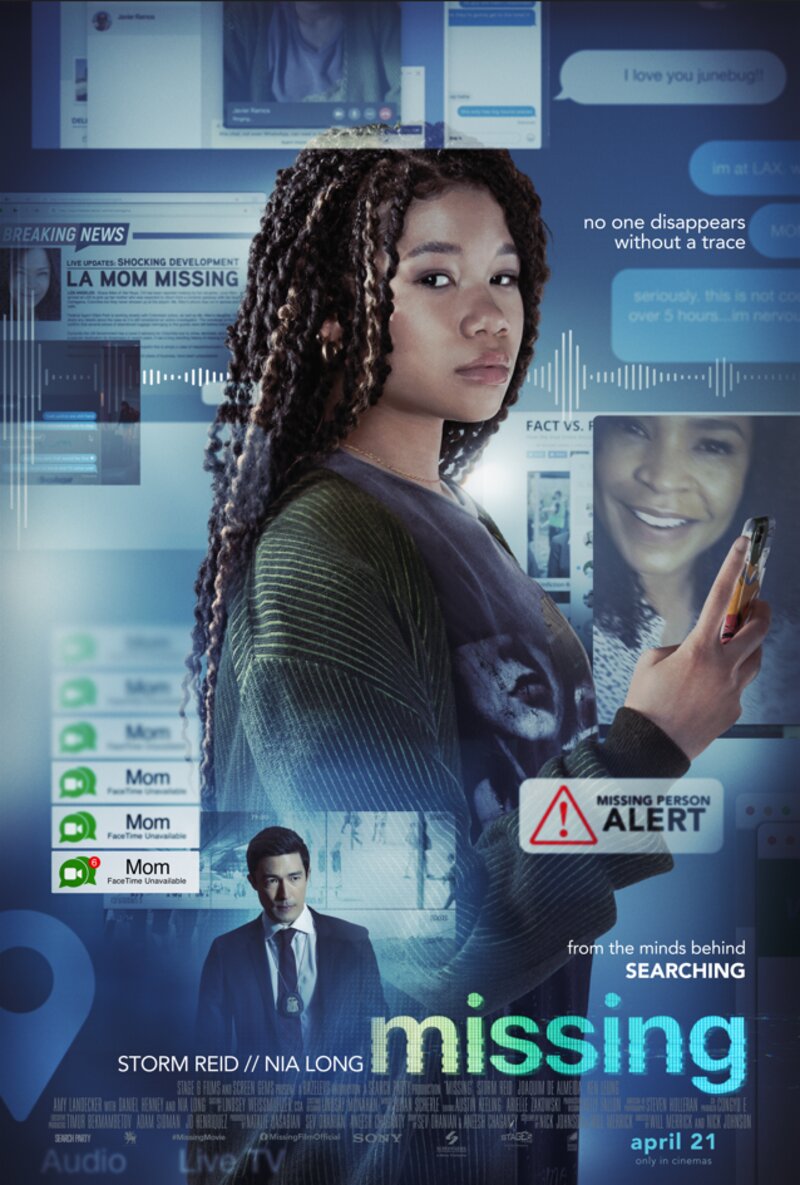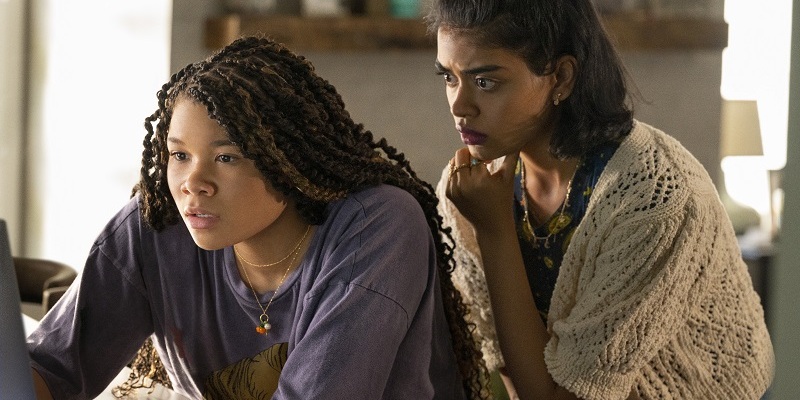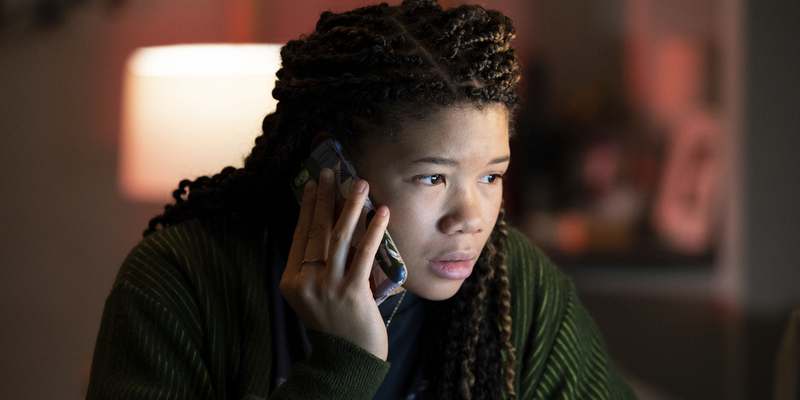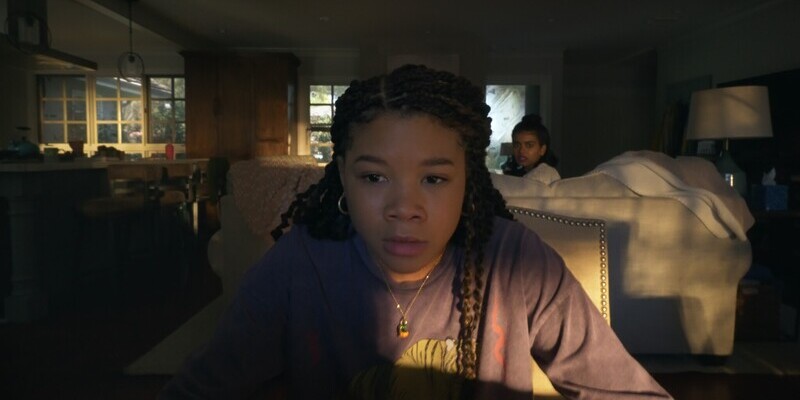
Review by
Eric Hillis
Directed by: Will Merrick, Nick Johnson
Starring: Storm Reid, Joaquim de Almeida, Ken Leung, Joaquim de Almeida, Nia Long, Amy Landecker, Daniel Henney

Missing comes from writer/directors
Nick Johnson and Will Merrick, who served as editors on
the 2018 thriller
Searching
(whose co-writers Sev Ohanian and Aneesh Chaganty receive
a "story by" credit here). Like that movie it plays out on the screens
of various devices accessed by the protagonist, and just like
Searching it opens with the tragic death of a spouse and
parent before quickly evolving into a missing person mystery.
Whereas Searching saw a father utilise various online
tools to uncover the whereabouts of his disappeared daughter, here it's
a teenage girl frantically searching for a missing parent.

18-year-old June (Storm Reid) is left alone for the weekend
while her mother Grace (Nia Long) is whisked away for a romantic
weekend in Cartagena, Colombia by her boyfriend Kevin (Ken Leaung). June is feeling down because it happens to be the weekend of
Father's Day, and we see her watch a home video clip of her family's
last holiday together before some ominous bleeding from her father's
nose cuts the footage, and seemingly his life, short.
Following a rowdy party, a hungover June heads to the airport to pick
up her mom and her beau, but neither of them disembark their flight.
Struggling to communicate with a Spanish speaking hotel worker, June
enlists the aid of Javier (Joaquim de Almeida), a Colombian
freelance odd job man, to help her snoop around Cartagena from her
desktop, communicating with Javier via Whatsapp.
Just as John Cho's anxious father did in Searching, June breaks into her mother's various online accounts, along with
those of Kevin, and in the process discovers how disconnected she really
is from her life. Various clues and red herrings are uncovered, and more
than a few twists are unveiled as the mystery unravels.

Missing boasts some clever storytelling, but also
requires the viewer not to ask inconvenient questions at several points.
It's equally gripping and frustrating. The film finds a neat way of
removing police involvement through having their hands tied by June
uncovering evidence and clues that they can't act upon because she
acquired them through an invasion of privacy. It employs a host of
technological developments that have become mainstream in the few short
years since Searching, including doorbell cameras and smart watches. But it also features
incidents that are never explained because to do so would tie the plot
up in knots the writers can't unravel. While it's engaging in the
moment, you'll likely find yourself breaking down the plot post-viewing
and asking some inconvenient questions.
With its young protagonist, Missing skews more towards a
Gen-Z audience than its predecessor. Part of what made
Searching so novel was how its amateur sleuth was a
forty-something unfamiliar with much of the technology that played a
role in his daughter's daily life. This lead to a combination of comedy
and frustration, two elements largely absent from the more online savvy
June's sleuthing.

The expansion of technology between the two movies also makes
Missing less interesting as a formal exercise. Unlike the
Unfriended
movies (arguably the pinnacle of these "screenlife" thrillers), which
played their narratives out in real time while sticking rigidly to
replicating a desktop on screen, both Searching and
Missing play out over several days and add various clips
such as news reports into the mix. It feels a little like cheating, and
it doesn't help that the recreations of real life news shows are so
unconvincing they resemble SNL sketches. Like Searching, Missing sees its omniscient camera zoom into specific
details on screen, which often results in chopping up camera footage
into the sort of combinations of close-ups and wide shots you might find
in a more formally conventional piece of filmmaking. This is
particularly the case in the climax, which for all intents and purposes
drops the screenlife format through its editing of an unlikely variety
of CCTV cameras at a certain location. When June dons a smart watch
equipped with a camera and heads off to a rendezvous with a suspect, we
might as well be watching a run of the mill found footage
thriller.
The best screenlife thrillers are fuelled primarily by their clever
adoption of technology, and they get under our skin because they present
us with a façade that we've become accustomed to staring at in our daily
lives. Missing might be the first of these movies in which
the characters are more interesting than the mystery. That's credit to
the performances of Reid and de Almeida, who make for a sympathetic pair
of unlikely damaged detectives. But there's a sense that the technology
has gotten out of hand at this point, and the sub-genre would be wise to
return to its more limited roots and stick to the screen as it
were.

